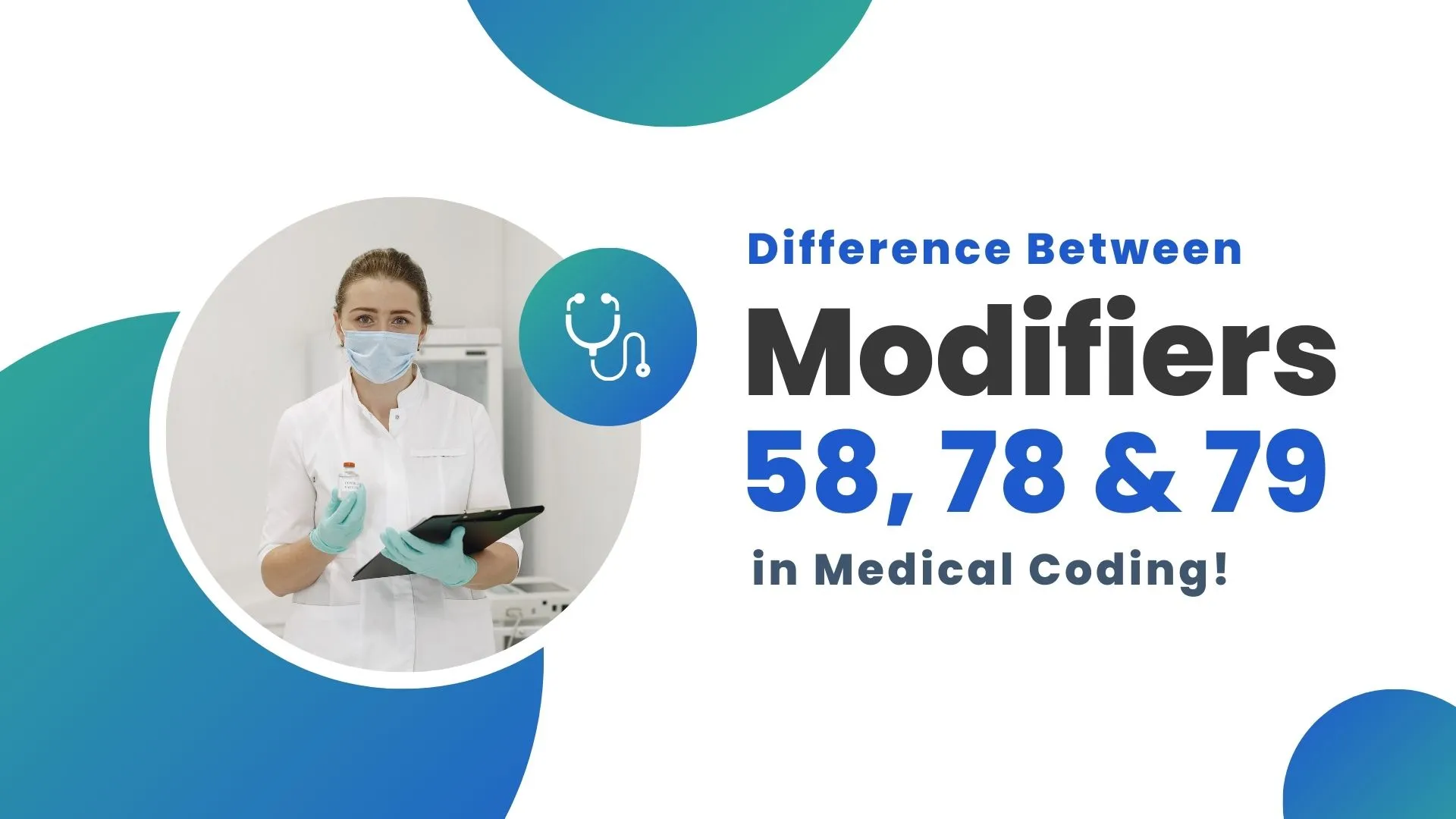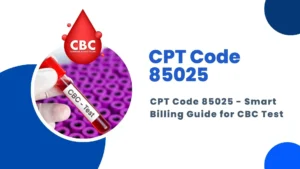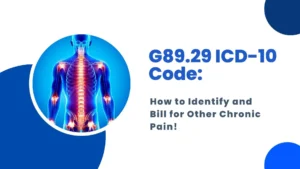Are you a medical biller and coder? If YES, then you are already aware of how CPT (Current Procedural Terminology) modifiers work. They are useful to clarify services and procedures. Modifiers 58, 78, and 79 are commonly used in medical billing but misunderstood. Specifically, they are used when additional procedures are performed during the global period of a prior surgery.
In knowing these modifiers, you can not only bring compliance with payer guidelines but also obtain proper reimbursement. Each modifier signals a specific scenario and outcome for both documentation and billing. Are you interested to learn more? Continue reading!
Modifier 58: Planned Procedure During the Recovery Time by the Same Doctor
Modifier 58 Description
Use modifier 58 when a second procedure is done during the healing time after the first surgery, and it was planned ahead of time. It may involve a bigger or more involved procedure and a treatment following a test. It means the second procedure was expected and part of the overall care plan, not because of a problem or complication.
Key Points
- Mod 58 starts a new global period.
- It is reimbursed at 100% of the allowable amount.
- The second procedure must be related to the original but either more extensive or staged.
Example
For breast cancer, a surgeon performs a mastectomy. A few weeks later, reconstructive surgery is planned. Because this is a planned procedure, Modifier 58 is appropriate.
Modifier 78: Unplanned Return to the Operating Room During Recovery by the Same Doctor
What is modifier 78?
Modifier 78 is perfect for a patient who has to go back to the operating room during the healing time after surgery due to some problem or complication from the first surgery. This second visit was not planned.
Key Points
- The return to surgery was unexpected
- It’s related to the first procedure
- It does not start a new healing (global) period
- Only part of the cost (usually the surgery part) is paid
Example
A patient undergoes gallbladder removal. Five days later, the patient returns to the OR for drainage of an abscess. Since this is an unplanned return for a complication, Modifier 78 applies.
Modifier 79: Unrelated Procedure During Recovery by the Same Doctor
Modifier 79 Description with Example
Use the 79 modifier when a second procedure is done during the healing time after the first surgery, but it is not related to the first one. It could be on a different body part or for a different problem.
Key Points
- Modifier 79 in medical billing starts a new global period.
- You get full payment for the second procedure.
- The subsequent procedure must be clinically unrelated to the first.
Example
A patient has knee surgery on the left leg. Two weeks later, they require carpal tunnel release on the right wrist. These are unrelated; thus, the carpal tunnel surgery should be billed with Modifier 79.
When to Use These Modifiers 58, 78, and 79?
It is important to know when to use these global period modifiers for proper claim submission. Following is a short guide:
| Modifier | Use When… |
|---|---|
| 58 | The second procedure is planned at the time of the first surgery, more extensive or therapeutic, following diagnostic service. |
| 78 | A complication from the initial surgery causes the patient to need an unplanned return to the operating room for a procedure. |
| 79 | The second procedure is not related to the first, and happens in the postoperative period at a different anatomical site or for a different condition. |
These rules apply only during the global period of the first surgery (0, 10, or 90 days, depending on the procedure).
Now, we will compile all the above information in a table form so that you can have a quick review of these global surgery modifiers and compare them briefly.
| Modifier | Description | Planned/Unplanned | Related/Unrelated | Starts a New Global Period? | Reimbursement |
| 58 | Staged or therapeutic procedure | Planned | Related | Yes | Full |
| 78 | Unplanned return to the OR for a complication | Unplanned | Related | No | Intraoperative portion only |
| 79 | Unrelated procedure during a global period | Either | Unrelated | Yes | Full |
Coding Pitfalls to Avoid
It is not enough to know the difference between these modifiers; also, know the mistakes that even seasoned coders can make with these modifiers. The following are some common errors:
- Use modifier 78 for planned follow-ups, so always reserve it for unplanned returns due to complications.
- Failing to document the plan for Modifier 58, so if a follow-up procedure was planned, make sure the medical record clearly reflects this.
- Skipping Modifier 79 when procedures are unrelated. Remember, omitting it can result in claim denials or reduced reimbursement.
Documentation Tips
Clear documentation is your best defense when using these modifiers. Make sure to include:
- Procedure notes detailing whether the surgery was planned or unplanned
- Diagnosis codes to establish whether procedures are related or unrelated
- Surgical history and treatment plans to justify staging or additional procedures.
Reimbursement Considerations
Each modifier directly affects how much is reimbursed. Modifier 58 and modifier 79 mean full reimbursement and reset the global period. While Modifier 78 does not reset the global period and pays only for the intraoperative part, not post-op care.
For instance, if you enter a $2,000 procedure with a Modifier 78, you might only get reimbursed $800 if the intraoperative portion is only 40% worth.
Frequently Asked Questions!
Which Modifier Comes First: 58/78?
Modifier 58 comes before 78 when both are used together. So, if both apply, use 58 first because it means the procedure was expected. Remember, the order of modifiers matters when billing to make sure the claim is processed correctly.
What Actually is a CPT Modifier?
A CPT modifier is a two-digit code made of numbers, letters, or both. It’s added to a 5-digit CPT code. The CPT code shows what service was done, and the modifier gives extra info, like if something was done a little differently or in a special case.
When to Use CPT vs. HCPCS Codes?
CPT modifier 58, or other codes, show surgical, medical, or test services that doctors and other healthcare workers perform. You can use HCPCS codes when billing Medicaid, Medicare, or other insurance. These codes also include things not listed in CPT, like supplies and equipment.
Also read: Modifier 24 vs. 25 – Key Differences & Proper Usage in Medical Billing
Final Thoughts!
In short, knowing the difference between modifiers 58, 78, and 79 is very important for correct medical billing. Each one tells the insurance company a different story. Using the wrong one can lead to payment issues or claim denials. Our blog makes it simple to understand when and how to use each modifier. With the right use and good documentation, you can make sure you get paid properly and stay within the rules. It is a small step that makes a big difference in billing success.




